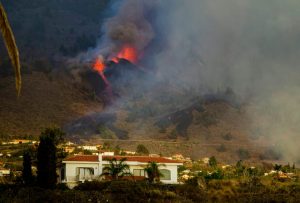Madrid: A volcano erupted on the Spanish island of La Palma on Sunday, with several violent explosions in the El Paso municipality in the south of the island forcing at least 5,000 people to flee the area, according to local media.
The volcano spewed rock fragments and red-hot lava into the air, while sending up large amounts of brown and white smoke following an initial eruption at 3:12 pm (1412 GMT), according to El Pais newspaper.
The Guardi Civil have evacuated at least 5,000 people affected by the eruption, the El Pais reported online. Among those evacuated from surrounding areas so far are 500 tourists, television station Canaris7 reported earlier, dpa reports.
The fire brigade was fighting forest fires caused by the eruption, while a large ash cloud could be seen over the island, home to the Cumbre Vieja volcanic ridge.
Broadcasters showed footage of lava flowing slowly downhill from the volcano towards the coast, crossing a road and surrounding at least one house.
Authorities on the small island with around 83,000 residents called on people to remain calm as the eruption is not particularly explosive so far.
But authorities called a red alert volcanic emergency plan and began evacuations. Spain’s Prime Minister Pedro Sanchez canceled a planned trip to the United States and arrived on La Palma in the evening.
Because of the approaching lava, which rolled downhill towards the coast in the form of orange-glowing rivers in the dark, around 5,000 residents of the villages of El Paso, Llanos de Aridane and the seaside resort of Tazacorte on the west coast of the island were brought to safety.
The eruption had been expected after thousands of seismic shocks in the past few days. In addition, the ground had been pushed upwards slightly in some places, indicating that magma was accumulating under the Cumbre Vieja.
The volcano had at least seven so-called vents, places from which ash, smoke and lava erupt, state television station RTVE reported. Earlier reports spoke of three to six vents.
Earlier this week, authorities had told people in the south to pack luggage along with their mobile phones, important documents and any medication they may need should they have to evacuate.
The last eruption in La Palma took place in October 1971, when the Teneguia volcano spewed lava for more than three weeks after a fissure appeared in the south of the island.
La Palma, unlike the better-known islands of Gran Canaria, Fuerteventura, Lanzarote and Tenerife, is not a popular tourist destination.




